冀教版 八年级上 Unit 4 Lesson 20 No Stopping!课件 (共24张PPT,无音频)
文档属性
| 名称 | 冀教版 八年级上 Unit 4 Lesson 20 No Stopping!课件 (共24张PPT,无音频) |
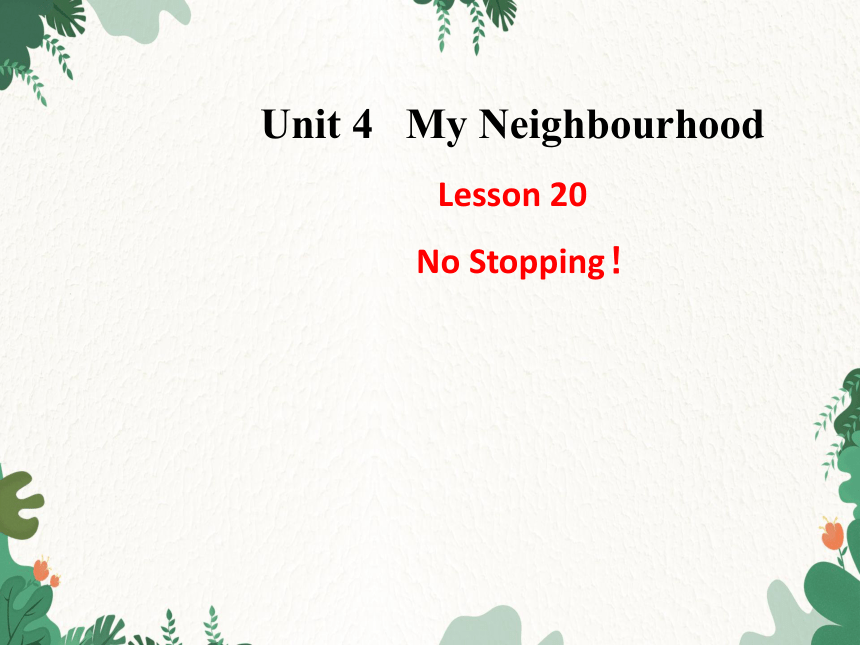
|
|
| 格式 | ppt | ||
| 文件大小 | 3.6MB | ||
| 资源类型 | 教案 | ||
| 版本资源 | 冀教版 | ||
| 科目 | 英语 | ||
| 更新时间 | 2022-07-19 11:22:50 | ||
图片预览

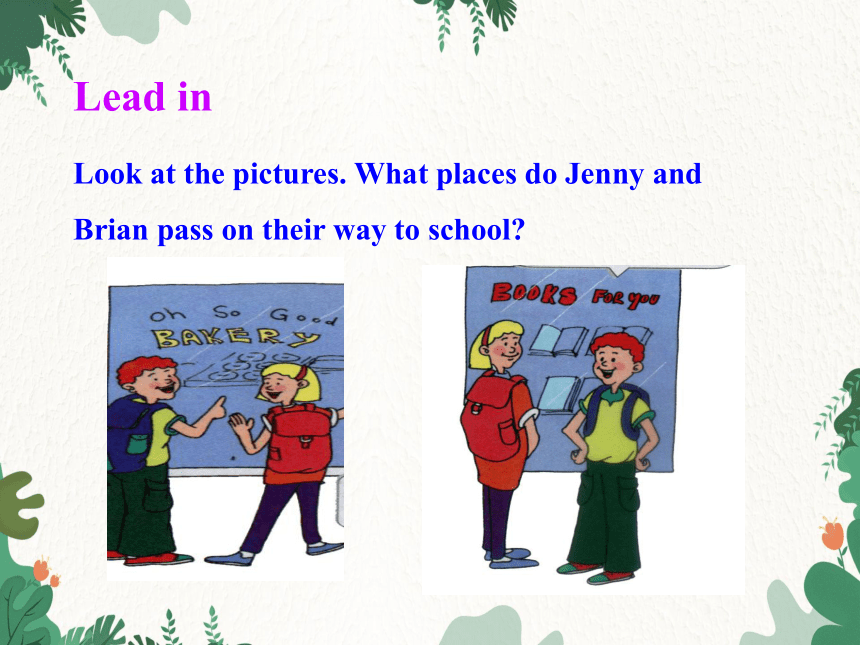

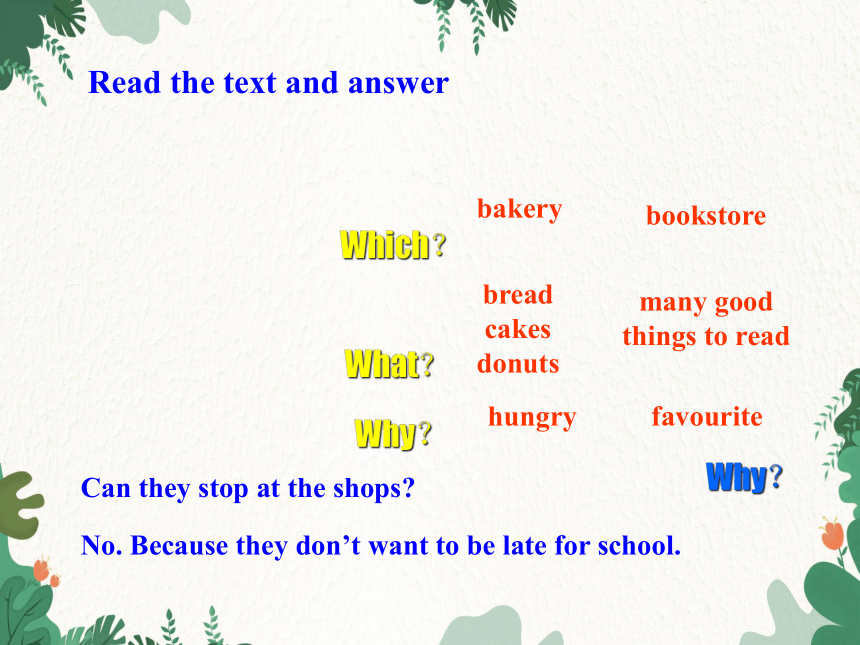

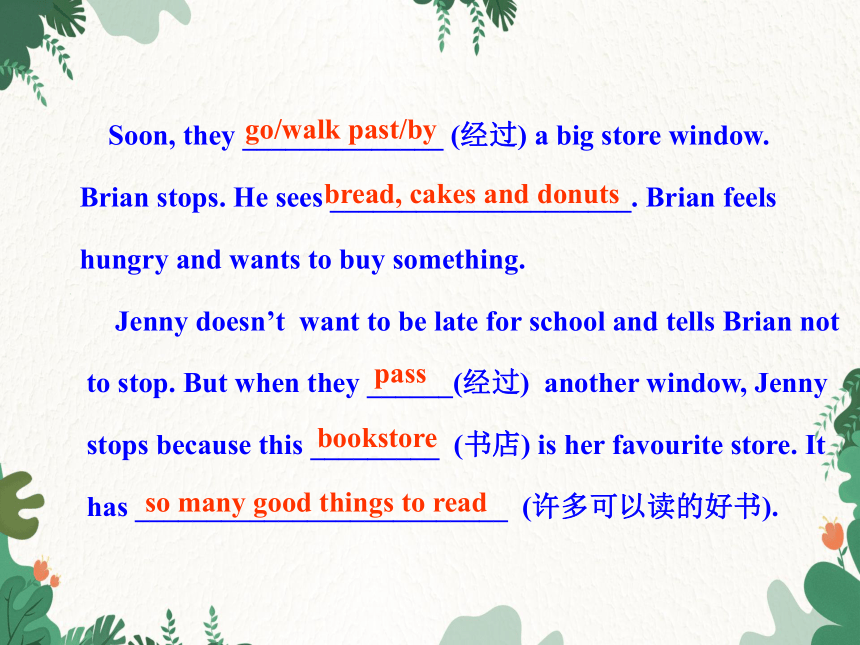
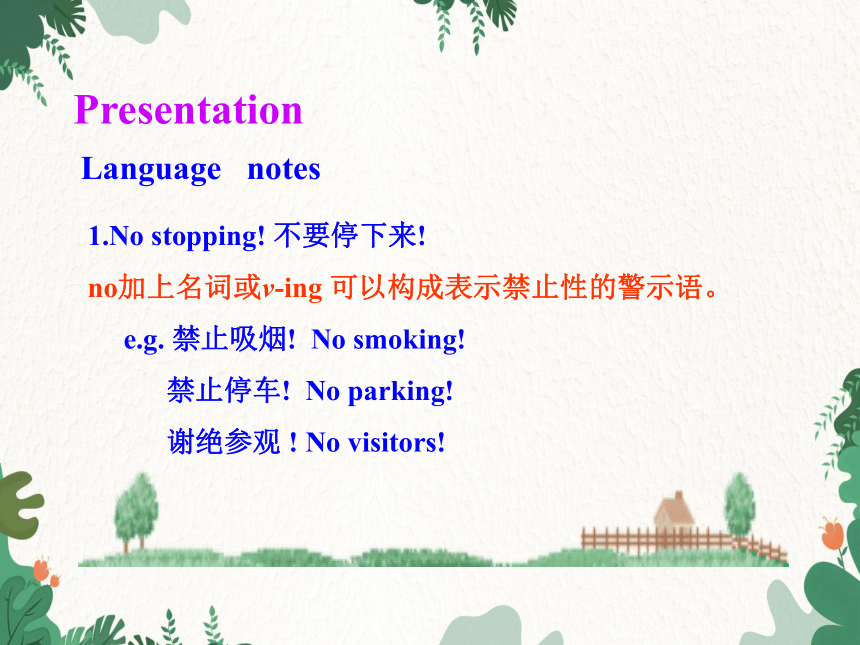
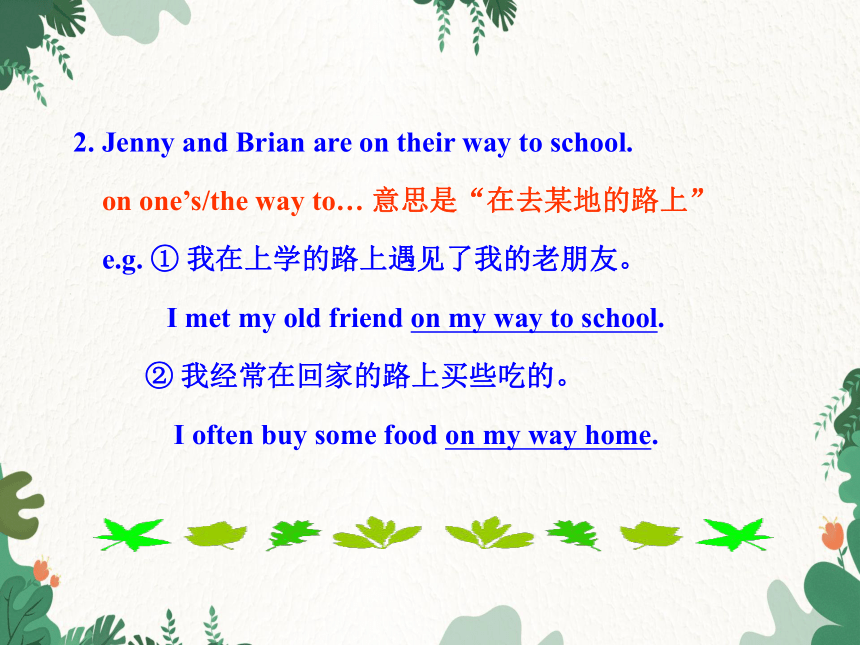
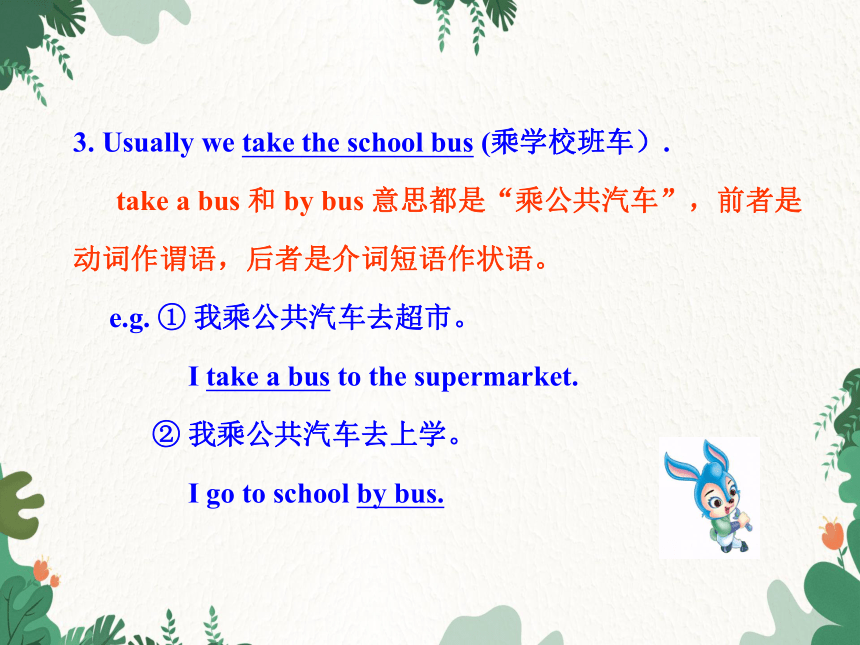
文档简介
(共24张PPT)
Unit 4 My Neighbourhood
Lesson 20
No Stopping!
Lead in
Look at the pictures. What places do Jenny and Brian pass on their way to school
1.Where are Jenny and Brian
On their way to school.
2.What does Jenny want to do
Jenny wants to show Brian the neighbourhood.
3.What stores do they see on the way
A bakery and a bookstore.
Listen and answer :
bakery
bookstore
bread
cakes
donuts
many good
things to read
hungry
favourite
Can they stop at the shops
Which?
What?
Why?
Why?
No. Because they don’t want to be late for school.
Read the text and answer
Jenny and Brian are ____________________(在去学校的路上). They are walking because it’s sunny. Brian says they usually _________________ (乘校班车). Jenny says she wants to show Brian the neighbourhood.
They come to a corner. Brian asks, “Do we __________ (走这条路) now ” Brian is ___________(指向)the right. Jenny says, “No. _________(向左转)”. Then they look left,_________ (向右看看) and _____________ (穿过街道). Jenny says she likes going this way because they can go past some of her favourite shops.
on their way to school
take the school bus
go this way
pointing to
Turn left
look right
cross the street
go/walk past/by
bread, cakes and donuts
pass
bookstore
so many good things to read
Soon, they ______________ (经过) a big store window.
Brian stops. He sees _____________________. Brian feels
hungry and wants to buy something.
Jenny doesn’t want to be late for school and tells Brian not
to stop. But when they ______(经过) another window, Jenny
stops because this _________ (书店) is her favourite store. It
has __________________________ (许多可以读的好书).
Language notes
Presentation
1.No stopping! 不要停下来!
no加上名词或v-ing 可以构成表示禁止性的警示语。
e.g. 禁止吸烟! No smoking!
禁止停车! No parking!
谢绝参观 ! No visitors!
2. Jenny and Brian are on their way to school.
on one’s/the way to… 意思是“在去某地的路上”
e.g. ① 我在上学的路上遇见了我的老朋友。
I met my old friend on my way to school.
② 我经常在回家的路上买些吃的。
I often buy some food on my way home.
3. Usually we take the school bus (乘学校班车).
take a bus 和 by bus 意思都是“乘公共汽车”,前者是动词作谓语,后者是介词短语作状语。
e.g. ① 我乘公共汽车去超市。
I take a bus to the supermarket.
② 我乘公共汽车去上学。
I go to school by bus.
4. We will go past some of my favourite shops.
past 用作介词, 和动词连用,表示“经过” 。
eg. ① 我经常走过那个花园。
I often walk past the garden.
② 她昨天七点钟走过那家商店。
She went past the bookstore at seven yesterday.
5. Soon, they walk past a big store window.
past 用作介词,意思是“经过” 。
e.g. 当你走过那家商店时,你能买到一些水果。
You can buy some fruits when you walk past the shop.
go past , walk past, go by, walk by 相当于pass
passed 的发音与 past /pa:st /相同。
6. They cross the street.
cross 是动词, across 是介词,不能单独作谓语,但可以和动词搭配使用。意思是 “横穿” 。
e.g.当交通灯红的时候,我们不能横穿马路。
① We can’t cross the road when the traffic light is red.
② We can’t go across the road when the traffic light is red.
ay
orner
ast
ross
ookstores
eighbourhood
top
考考你的记忆力
1.They met the old man on their w___ to school.
2. Li Mei is sitting in the c______ of the room.
3. I go p____ the post office every day.
4. Don’t c_____ the road when the light is red.
5. There are many books in the b_________.
6. Please show me your n______________.
7. Let’s s____ to have a rest.
1. I’ll tell her the news, when I _____ her house.
A. past B. pass C. cross D. across
2. My bike was broken ______.
A. on my way to home
B. by the way home
C. on my way home
3. I can’t go to a movie with you_____ I feel sick.
A. why B. because C. so D. and
Practice
Ⅰ.单项选择
4. I haven’t met ____ people.
A. such many B. such much C. so many D. so much
5. Hurry up! I don’t want to _____ meeting.
A. be late to B. be late for C. late to D. late for
6. We need a place ____ kites.
A. fly B. flies C. flying D. to fly
7. Li Lei is walking. He is _______ his way _______ home.
A. for, / B. on, to C. at, to D. on, /
8. You need to _______ the street to get there.
A. across B. past C. pass D. cross
9. They walk _____ a big store window.
A. pass B. past C. passes D. passing
10. She is _______ a bus to the bookstore.
A. having B. painting C. taking D. bringing
Ⅱ. 根据首字母或汉语提示写出所缺单词
1.He walked round the________(拐角)into the next street.
2.Brian is_________(指着) to the right and asks, “Do we go this way now ”
3.There is a fruit shop in my_______________(街区).
4.They met the teacher on their w____to school.
5. There are too many books in the b_________.
6. It is s______ today. Why not go out for a walk
corner
pointing
neighbourhood
ay
ooksores
unny
___
_____
_____
_____
___
Ⅲ.选择恰当的词完成句子.
1. Chen Hong went _____(pass, past) the bookstore and bought a map.
2. Let him ______(look, look at) all the foods in the window.
3. Please go ____(across, cross, crossing) the street, the park is on your left.
4. No _____ (talk , talking), please.
5.We can see many trees on ____ (our, us) way home.
to do
is crossing
to tell
their
passes
6.I have so many things ____ (do).
7.Look, the dog __________ (cross) the street.
8.Do you want ______(tell) me anything about your school
9.Look, the children are on _____(they) way home.
10.The girl ______ (pass) the shop every day.
Ⅳ.试着将下列短语译成英语
1.向左拐______________
2.穿过街道____________
3.在某人去……的路上______________
4.上学迟到________________
5.走/路过__________________
6.一个大的商店橱窗_________________
7.我最喜欢的商店_________________
8.那么多好东西___________________
9.坐学校公共汽车___________________
10.快点,加油____________
turn left
cross the street
on one’s way to
be late for school
go/walk past/by
a big store window
my favourite shops
so many good things
take the school bus
come on
corner
School
Neighbourhood
1. come to the corner 2. turn left 3. cross the street
4. turn right 5. go past …shops 6. get to school
How do they get to school
Homework
How do you get to school You can use the following expressions: come to the corner, turn left , cross the street , turn right, get to school,and on my way to school, _________. I see ________, I like_______ best because I________ .Write a passage about it.
A leopard cannot change its spots.
积习难改。
Unit 4 My Neighbourhood
Lesson 20
No Stopping!
Lead in
Look at the pictures. What places do Jenny and Brian pass on their way to school
1.Where are Jenny and Brian
On their way to school.
2.What does Jenny want to do
Jenny wants to show Brian the neighbourhood.
3.What stores do they see on the way
A bakery and a bookstore.
Listen and answer :
bakery
bookstore
bread
cakes
donuts
many good
things to read
hungry
favourite
Can they stop at the shops
Which?
What?
Why?
Why?
No. Because they don’t want to be late for school.
Read the text and answer
Jenny and Brian are ____________________(在去学校的路上). They are walking because it’s sunny. Brian says they usually _________________ (乘校班车). Jenny says she wants to show Brian the neighbourhood.
They come to a corner. Brian asks, “Do we __________ (走这条路) now ” Brian is ___________(指向)the right. Jenny says, “No. _________(向左转)”. Then they look left,_________ (向右看看) and _____________ (穿过街道). Jenny says she likes going this way because they can go past some of her favourite shops.
on their way to school
take the school bus
go this way
pointing to
Turn left
look right
cross the street
go/walk past/by
bread, cakes and donuts
pass
bookstore
so many good things to read
Soon, they ______________ (经过) a big store window.
Brian stops. He sees _____________________. Brian feels
hungry and wants to buy something.
Jenny doesn’t want to be late for school and tells Brian not
to stop. But when they ______(经过) another window, Jenny
stops because this _________ (书店) is her favourite store. It
has __________________________ (许多可以读的好书).
Language notes
Presentation
1.No stopping! 不要停下来!
no加上名词或v-ing 可以构成表示禁止性的警示语。
e.g. 禁止吸烟! No smoking!
禁止停车! No parking!
谢绝参观 ! No visitors!
2. Jenny and Brian are on their way to school.
on one’s/the way to… 意思是“在去某地的路上”
e.g. ① 我在上学的路上遇见了我的老朋友。
I met my old friend on my way to school.
② 我经常在回家的路上买些吃的。
I often buy some food on my way home.
3. Usually we take the school bus (乘学校班车).
take a bus 和 by bus 意思都是“乘公共汽车”,前者是动词作谓语,后者是介词短语作状语。
e.g. ① 我乘公共汽车去超市。
I take a bus to the supermarket.
② 我乘公共汽车去上学。
I go to school by bus.
4. We will go past some of my favourite shops.
past 用作介词, 和动词连用,表示“经过” 。
eg. ① 我经常走过那个花园。
I often walk past the garden.
② 她昨天七点钟走过那家商店。
She went past the bookstore at seven yesterday.
5. Soon, they walk past a big store window.
past 用作介词,意思是“经过” 。
e.g. 当你走过那家商店时,你能买到一些水果。
You can buy some fruits when you walk past the shop.
go past , walk past, go by, walk by 相当于pass
passed 的发音与 past /pa:st /相同。
6. They cross the street.
cross 是动词, across 是介词,不能单独作谓语,但可以和动词搭配使用。意思是 “横穿” 。
e.g.当交通灯红的时候,我们不能横穿马路。
① We can’t cross the road when the traffic light is red.
② We can’t go across the road when the traffic light is red.
ay
orner
ast
ross
ookstores
eighbourhood
top
考考你的记忆力
1.They met the old man on their w___ to school.
2. Li Mei is sitting in the c______ of the room.
3. I go p____ the post office every day.
4. Don’t c_____ the road when the light is red.
5. There are many books in the b_________.
6. Please show me your n______________.
7. Let’s s____ to have a rest.
1. I’ll tell her the news, when I _____ her house.
A. past B. pass C. cross D. across
2. My bike was broken ______.
A. on my way to home
B. by the way home
C. on my way home
3. I can’t go to a movie with you_____ I feel sick.
A. why B. because C. so D. and
Practice
Ⅰ.单项选择
4. I haven’t met ____ people.
A. such many B. such much C. so many D. so much
5. Hurry up! I don’t want to _____ meeting.
A. be late to B. be late for C. late to D. late for
6. We need a place ____ kites.
A. fly B. flies C. flying D. to fly
7. Li Lei is walking. He is _______ his way _______ home.
A. for, / B. on, to C. at, to D. on, /
8. You need to _______ the street to get there.
A. across B. past C. pass D. cross
9. They walk _____ a big store window.
A. pass B. past C. passes D. passing
10. She is _______ a bus to the bookstore.
A. having B. painting C. taking D. bringing
Ⅱ. 根据首字母或汉语提示写出所缺单词
1.He walked round the________(拐角)into the next street.
2.Brian is_________(指着) to the right and asks, “Do we go this way now ”
3.There is a fruit shop in my_______________(街区).
4.They met the teacher on their w____to school.
5. There are too many books in the b_________.
6. It is s______ today. Why not go out for a walk
corner
pointing
neighbourhood
ay
ooksores
unny
___
_____
_____
_____
___
Ⅲ.选择恰当的词完成句子.
1. Chen Hong went _____(pass, past) the bookstore and bought a map.
2. Let him ______(look, look at) all the foods in the window.
3. Please go ____(across, cross, crossing) the street, the park is on your left.
4. No _____ (talk , talking), please.
5.We can see many trees on ____ (our, us) way home.
to do
is crossing
to tell
their
passes
6.I have so many things ____ (do).
7.Look, the dog __________ (cross) the street.
8.Do you want ______(tell) me anything about your school
9.Look, the children are on _____(they) way home.
10.The girl ______ (pass) the shop every day.
Ⅳ.试着将下列短语译成英语
1.向左拐______________
2.穿过街道____________
3.在某人去……的路上______________
4.上学迟到________________
5.走/路过__________________
6.一个大的商店橱窗_________________
7.我最喜欢的商店_________________
8.那么多好东西___________________
9.坐学校公共汽车___________________
10.快点,加油____________
turn left
cross the street
on one’s way to
be late for school
go/walk past/by
a big store window
my favourite shops
so many good things
take the school bus
come on
corner
School
Neighbourhood
1. come to the corner 2. turn left 3. cross the street
4. turn right 5. go past …shops 6. get to school
How do they get to school
Homework
How do you get to school You can use the following expressions: come to the corner, turn left , cross the street , turn right, get to school,and on my way to school, _________. I see ________, I like_______ best because I________ .Write a passage about it.
A leopard cannot change its spots.
积习难改。
同课章节目录
- Unit 1 Me and My Class
- Lesson 1 Back to School!
- Lesson 2 Many Faces, One Picture
- Lesson 3 Getting to Know You!
- Lesson 4 Best Friends
- Lesson 5 Meet Ms. Liu
- Lesson 6 Jenny's Week
- Unit 2 My Favourite School Subject
- Lesson 7 Don't Be Late for Class!
- Lesson 8 E-mail Helpers!
- Lesson 9 I Don't Want to Miss Geography !
- Lesson 10 Looking for Lisa
- Lesson 11 Lily Learns about China !
- Lesson 12 Karen's Hair Stood Up!
- Unit Review
- Unit 3 Families Celebrate Togethe
- Lesson 13 I Love Autumn
- Lesson 14 Happy Memories
- Lesson 15 A Present for Li Ming!
- Lesson 16 Happy Thanksgiving!
- Lesson 17 Presents from Canada!
- Lesson 18 Li Ming's Birthday
- Unit Review
- Unit 4 My Neighbourhood
- Lesson 19 The Best Neighourhood
- Lesson 20 No Stopping!
- Lesson 21 Eat a Donut and Turn Right
- Lesson 22 I Like My Neighbourhood
- Lesson 23 People in My Neighbourhood
- Lesson 24 I Need a Map!
- Unit Review
- Unit 5 My Future
- Lesson 25 I Want to Be a Teacher!
- Lesson 26 What Will I Be ?
- Lesson 27 What's Your Advice?
- Lesson 28 Rich or Poor? It Doesn't Matter!
- Lesson 29 Our Ambitions and Dreams
- Lesson 30 A Famous Friend?
- Unit Review
- Unit 6 Go With Transportation !
- Lesson 31 How Do You Travel ?
- Lesson 32 Trains Go Faster !
- Lesson 33 Life on Wheels
- Lesson 34 Flying Donuts
- Lesson 35 Future Transportation
- Lesson 36 Clean Cars ?
- Unit Review
- Unit 7 Enjoy Your Hobby
- Lesson 37 What's Your Hobby ?
- Lesson 38 Hobbies Are Fun!
- Lesson 39 Danny's Hobby
- Lesson 40 What's Paul's Hobby?
- Lesson 41 Show and Tell!
- Lesson 42 The New Club
- Unit Review
- Unit 8 Celebrating Me
- Lesson 43 What Makes You Unique?
- Lesson 44 Georgia Plays Basketball
- Lesson 45 Be Yourself !
- Lesson 46 My Dream
- Lesson 47 I Made It !
- Lesson 48 Li Ming's Report
- Unit Review
